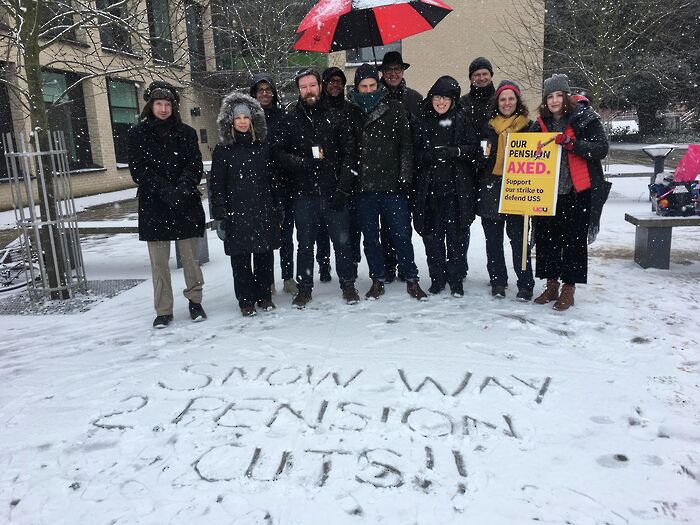Students speak out about inner conflicts amid strikes
Varsity spoke to students about navigating the complex decisions they must make at picket lines

With increasing discussion about the impact of ongoing strikes on students’ education, several students have voiced growing concerns about the impact of the strikes on their mental and physical welfare, and are left without sufficient guidance as to how to navigate these complexities.
Students have targeted their criticisms at CUSU, expressing concern about the lack of preparation in advance of strike action, especially due to the negative impact the strikes have on certain subsections of the student body, such as the disabled. Although many students are in support of the strikes, concerns as to how the strikes will affect upcoming exams show no signs of fading.
Shadab Ahmed, a student at Christ’s College who announced his campaign to run as CUSU access and funding officer yesterday, voiced concerns about how the complexities of students’ decisions to cross picket lines have gone unmissed in what he deemed a “damaging rhetoric perpetuated by CUSU and other campaigns”.
He described the rhetoric as equating crossing picket lines with not being educated about the strikes or failing to display solidarity, then pointed out that there exist a range of mitigating factors and questions students must ask themselves when deciding to cross picket lines – for instance, books only available in departmental libraries, and the importance of labs for science students, who may miss out on a significant part of their teaching.
He emphasised: “There are situations as I have mentioned above in which I will cross the picket line, and should not be subjected to a guilt trip for,” and added, “this is not the same as breaking solidarity with the staff”.
The other candidate running for CUSU’s access and funding officer, Rhiannon Melliar-Smith, reiterated to Varsity that “CUSU have been democratically mandated by CUSU Council to support the strikes, thus they have to ask students not to cross picket lines”.
She noted, however, that CUSU have advised students not to attend the strikes, but this has repercussions for subsections of the student body. She said: “We must recognise that it is often those students with disabilities who are most impacted. Students with dyspraxia or other learning difficulties are put at a disadvantage when having to miss lectures”.
However, CUSU are actively considering ways to help and reduce the negative impact of the strikes on students. Melliar-Smith said: “I am aware that CUSU know that they could be doing more. At an open meeting with CUSU, CULC and CDE last week, we discussed ways in which CUSU can better reach out to these students, including hosting studio spaces for architecture students, and setting up mentoring systems between different year groups in STEM subjects. I would personally like to see CUSU talk more about the impact of the strike on students, especially disabled students, in order to hold UUK to account, as well as the University’s own provision for disabled students”.
The tension surrounding strike action has been physically manifested at the picket lines themselves. Varsity received several accounts of picketers attempting to force fliers into students’ hands. One lecturer told a student it was “unethical to cross a picket line.” Another student told Varsity that they were prevented from attending a scheduled supervision on the Sidgwick Site by an academic, who “squared up to [them] and asked if [entering the building] was a good idea, which [they] found uncomfortable and a little threatening”. In another case, a second-year Law student said that he was told to “go and f*** yourself,” after he told picketers that he supported the strike action but still needed to attend the lecture for his educational benefit.
Speaking to Varsity, Rhianna Voice, a student studying Classics at Trinity College, has been outspoken about her views on the grey area of students’ decisions to cross picket lines. She explained the conflict experienced by many, as students are forced to choose between their political and educational respects: “I respect the right to strike; it is an important method of expression. Nevertheless I also support the decision not to strike, I don’t think people should be forced to do things against their will.”
Lecturers too are torn between strike action and helping the education of their students. Voice mentioned that “one of her lecturers pleaded with their limited audience to continue attending as they recognised the added value for us of so doing”.
 News / Candidates clash over Chancellorship25 April 2025
News / Candidates clash over Chancellorship25 April 2025 Interviews / Dr Ally Louks on going viral for all the wrong reasons25 April 2025
Interviews / Dr Ally Louks on going viral for all the wrong reasons25 April 2025 Music / The pipes are calling: the life of a Cambridge Organ Scholar25 April 2025
Music / The pipes are calling: the life of a Cambridge Organ Scholar25 April 2025 News / Cambridge professor paid over $1 million for FBI intel since 199125 April 2025
News / Cambridge professor paid over $1 million for FBI intel since 199125 April 2025 Arts / Plays and playing truant: Stephen Fry’s Cambridge25 April 2025
Arts / Plays and playing truant: Stephen Fry’s Cambridge25 April 2025






